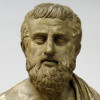“ For the mistakes which men make not only in ignorance but also from ignorance are excusable, while those which men do not from ignorance but (though they do them in ignorance) owing to a passion which is neither natural nor such as man is liable to, are not excusable. ”
Aristotle, Nicomachean Ethics (c. 334 BC - 330 BC). copy citation
| Author | Aristotle |
|---|---|
| Source | Nicomachean Ethics |
| Topic | ignorance passion |
| Date | c. 334 BC - 330 BC |
| Language | English |
| Reference | |
| Note | Translated by W. D. Ross |
| Weblink | http://classics.mit.edu/Aristotle/nicomachaen.mb.txt |
Context
“and these are the acts of injustice which imply that the doer is an unjust man, provided that the act violates proportion or equality. Similarly, a man is just when he acts justly by choice; but he acts justly if he merely acts voluntarily.
Of involuntary acts some are excusable, others not. For the mistakes which men make not only in ignorance but also from ignorance are excusable, while those which men do not from ignorance but (though they do them in ignorance) owing to a passion which is neither natural nor such as man is liable to, are not excusable.
9
Assuming that we have sufficiently defined the suffering and doing of injustice, it may be asked (1) whether the truth in expressed in Euripides' paradoxical words:
I slew my mother, that's my tale in brief.”
source


